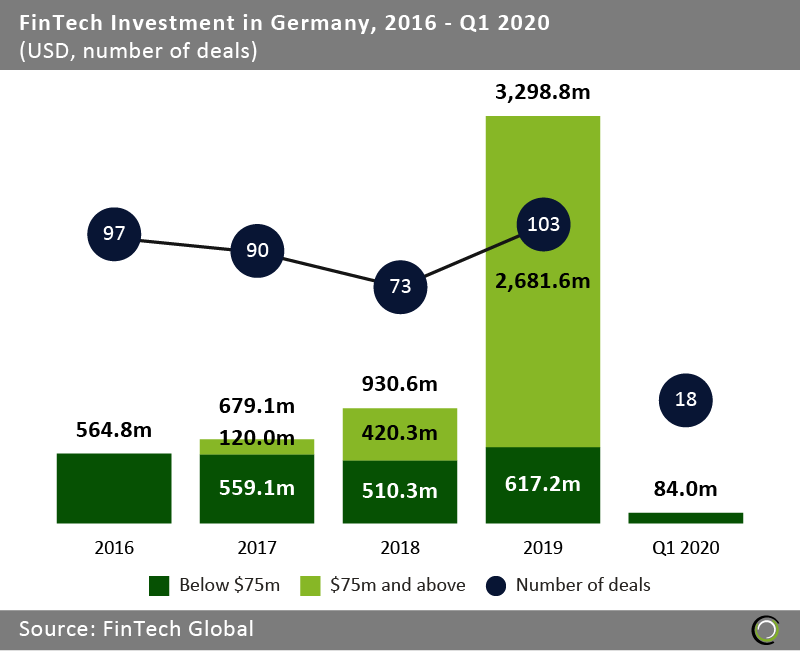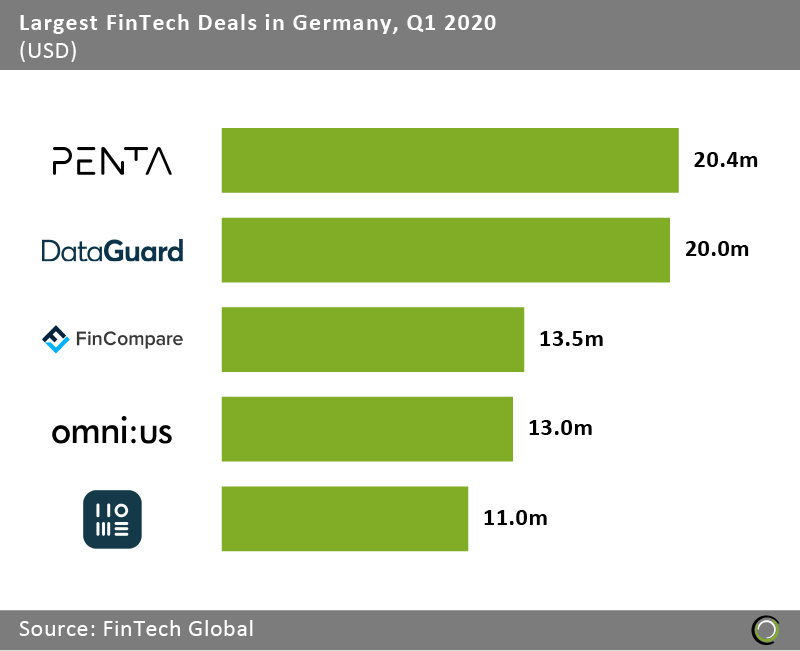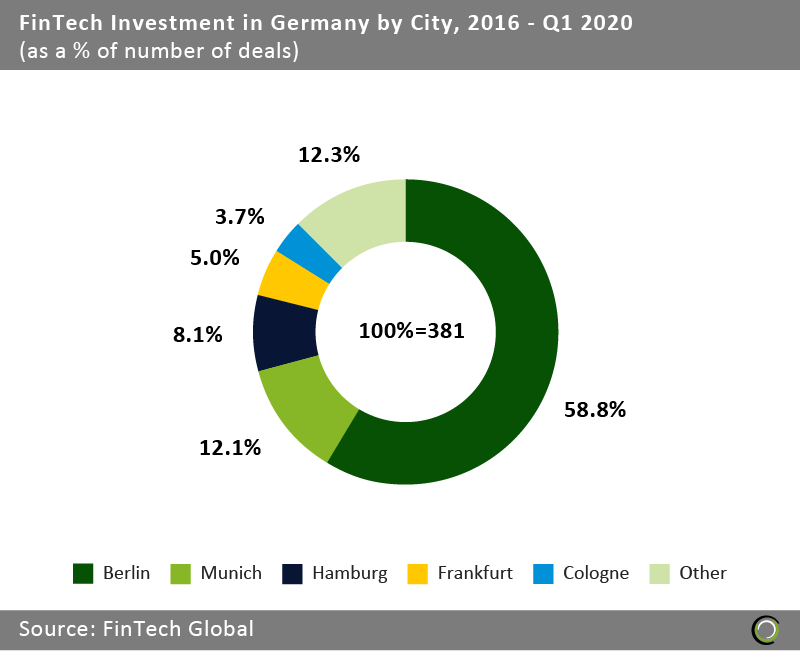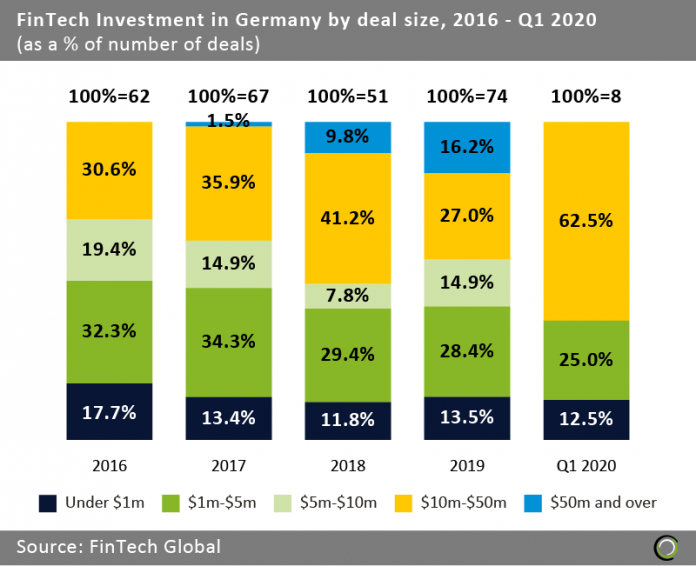FinTech funding in Germany declined nearly 90% in the first quarter of 2020 as no deals over $50m were completed, compared to the first three months of 2019
- As the FinTech industry matured in Germany, the share of deals valued at $50m and over jumped to 16.2% in 2019 growing from no transactions of this size bracket in 2016. This increase has mainly been driven by foreign investors entering the market with attractive opportunities in subsectors such as Payments & Remittances (Wirecard), InsurTech (wefox Group) and WealthTech (N26).
- However, no deals over $50m were recorded in the first three months of 2020, compared to four transactions completed in that range during Q1 2019. While it is important to note the presence of large deals is volatile over time, this resulted in a funding drop of 89.6% YoY.
- Furthermore, the share of deals valued at less than $5m experienced a drop in their share of deal activity from 50.0% in 2016 to 41.9% in 2019. That share dropped even further to 37.5% as we continue to see investors shying away from riskier early stage deals due to the uncertainty caused by the coronavirus pandemic.
FinTech deal activity in Q1 declined to its lowest level in five years

- FinTech companies in Germany raised nearly $5.5bn across 363 deals between 2016 and 2019. Funding increased at a CAGR of 80.1% over the period to a record high of $3.3bn last year. The record amount was driven by nine deals completed over $100m.
- However, funding to the sector declined sharply during the first three months of 2020 with only $84m capital raised compared to $787.1m in Q1 2019. Even if we exclude the large deals over $50m from the analysis, funding still declined by over 30.3% and if that rate continues for the rest of the year, then the German FinTech sector is on track to record its worst year since 2016 for investment activity
- While funding can be volatile over time due to surges caused by large deals being completed, deal activity tends to be more stable. Worryingly Q1 2020 saw only 18 FinTech deals completed in the country. That is the lowest level recorded during the first quarter over the last five years.
The top German deals in Q1 2020 raised $77.8m

- The top five FinTech deals in Germany completed during the opening quarter of 2020 raised in aggregate $77.8m, which equals to 92.6% of the overall investment in the country during the first quarter. Such high ratio is expected since we are seeing less early stage deals due to the economic uncertainty caused by the coronavirus pandemic as investors back established companies to minimise risk and protect their current portfolio of investments.
- The top five transaction came all from different sectors – WealthTech (Penta), RegTech (DataGuard), Marketplace Lending (FinCompare), InsurTech (omni:us) and Real Estate (Home HT) demonstrating the diversity of the German FinTech ecosystem.
- The largest deal of the period was raised by Penta, a digital business bank platform serving SMEs in Italy and Germany, which picked up $20.4m in a Series B round led by HV Holtzbrinck Ventures and RTP Global. In April 2019 Penta joined Finleap’s platform which helps build companies and also co-founded solarisBank. As part of that deal Marko Wenthin, who previously co-founded solarisBank became Penta’s new CEO.
Companies in Berlin completed nearly 60% of all FinTech deals in Germany since 2016

- Berlin has established itself as the FinTech hub in Germany with companies headquartered in the city completing 224 deals since 2016, which equals to 58.8% of all deals in the country over the period. With the widespread knowledge of English and low cost of living, the capital of Germany is attracting a very heterogeneous mix of talent from across the globe. Additionally, the city was chosen to host the IoT and FinTech hubs, as part of the national Digital Hub Initiative, a program developed to strengthen the digital market progression in Germany.
- Munich is the second most active city in Germany for FinTech investment with companies based in the city completing 46 deals since 2016. The city is home to several large FinTechs such as Wirecard, offering white label solutions for payment processing, IDNow, provider of Identity Verification-as-a-Service platform, and ottonova, a digital health insurer.
- The emergence of a thriving FinTech ecosystem in Germany has seen companies from another 28 cities raise funding during the period including Frankfurt, Cologne, Leipzig, Dusseldorf and Stuttgart.
The data for this research was taken from the FinTech Global database. More in-depth data and analytics on investments and companies across all FinTech sectors and regions around the world are available to subscribers of FinTech Global.
Copyright © 2020 FinTech Global





















